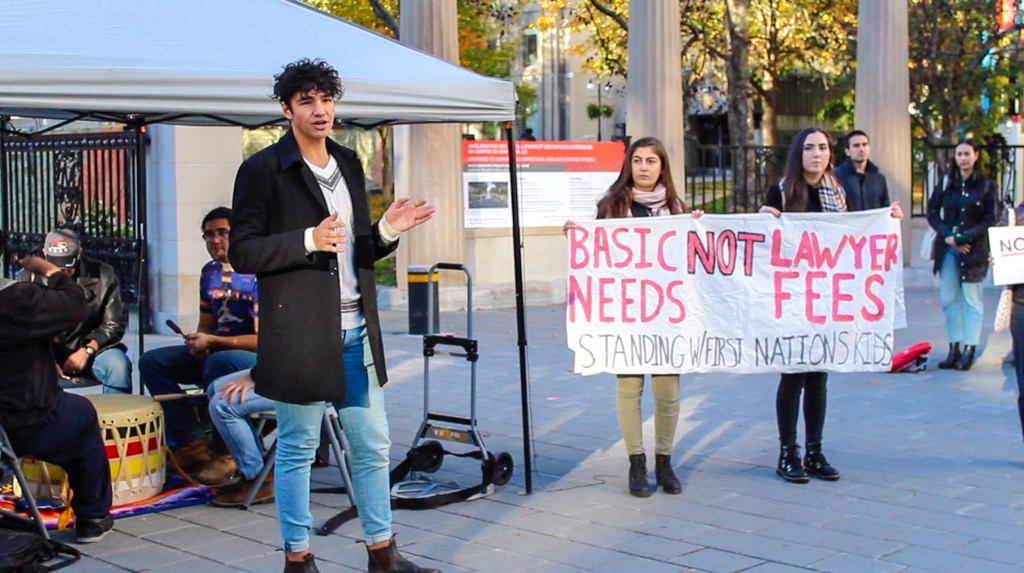The Canadian federal government has appealed a ruling by the Canadian Human Rights Tribunal, that ordered them to pay reparations to First Nations children and their families who were separated by the child-welfare system. In response, on Oct. 19, Students’ Society of McGill University (SSMU) Indigenous Affairs Commissioner Tomas Jirousek and the Indigenous Student Alliance (ISA) organized a protest in solidarity with the victims, calling on the government to improve on reconciliation.
Jirousek, a member of the Kainai First Nation of the Blackfoot confederacy, began the protest with a land acknowledgment and spoke on the intense trauma that Indigenous survivors of the child-welfare system experience.
“These aren’t just numbers on a factsheet,” Jirousek said. “These are kids who aren’t getting their childhoods back. These are kids who are spending nights, years away from their parents [and] cultures, just because the federal government doesn’t think [that] they are worth the money.”
Jo Roy, a member of the Abenaki First Nation, student representative for the Social Work Students’ Association (SWSA) and a current member of the Indigenous Affairs Committee, began by telling the story of Dene siblings who were reunited after separation and foster care. Betty-Ann Adam Dene was separated from her siblings during the ‘Sixties Scoop’, only to reunite decades later. Birth of a Family was a documentary that was filmed about their reunion.
“Please don’t think that the pain of Indigenous peoples is far removed from your lives here in this city, because it is not,” Roy said. “It is experienced by [Indigenous people] around you. [This] is why we’re standing here together, because the pain must end [….] It is not right to challenge the collective right for First Nations children to have a future free of pain.”
The Sixties Scoop refers to a period of provincial child welfare policies starting in the 1950s, where thousands of Indigenous children were forcibly removed from their families under false pretenses and placed in foster homes or adopted into white families across Canada and the United States. Children within this system often fell into vulnerable positions, leading to systemic abuse and harassment. As part of federal assimilation policies, children were forced to discount their languages and cultures. Residential schools, which were government-and church-run institutions, were created to forcefully assimilate Indigenous children.
Noah Favel, member of the Poundmaker Cree Nation and former co-chair of the ISA, spoke about the continued systemic discrimination by the Canadian government. Favel situated the protest in the larger conversation of structural barriers faced by Indigenous people.
“[The federal government’s] decision [to cease funding] perpetuates a system of poverty for people who are already so impoverished,” Favel said. “[…] Issues with housing, food security, and healthcare. [To] place this trauma on Indigenous children, who are already grappling with so many other issues […], people who are struggling to maintain our language, our heritage, [and] our customs. To put [this decision] on us when we have bigger things to focus on, it really hurts.”
The ruling specifies $40,000 for each child taken away from their family since Jan. 1, 2006 and for each of their parents or grandparents, amounting to an estimated $8 billion in compensation. Over 50 per cent of children in foster care are Indigenous, despite only representing seven per cent of children under 15. According to Indigenous Services Minister Seamus O’Regan, the federal government cannot come up with a plan to identify survivors and provide compensation by the Dec. 10 deadline. Nakuset, member of the Cree Nation and the Executive Director of the Native Women’s Shelter of Montreal, has worked at the shelter for 20 years. She began by talking about her own experiences with family separation, as she is the first person in her family to have children who were not taken by the system.
“This is a really difficult subject because my mother went to a residential school,” Nakuset said. “Because of her experience at residential schools, I ended up being a part of the Sixties Scoop, and being taken far away from my community [in Saskatchewan] and brought here to Montreal, where I was forced to grow up in a culture that wasn’t mine and to be ashamed [of my origins]. I was able to find that strength and go find my roots, and get my Indian status back, and get my education.”
The Truth and Reconciliation Commission (TRC) was a report funded by residential school survivors in 2008 to help them share their stories, and to investigate the full lasting impacts of this system. The document came with 94 calls to action for reconciliation. According to Nakuset, the reports and recommendations still did not elicit government action.
“TRC came out a couple of years ago […] when Trudeau came into power he said he was going to implement all 94 of the [recommendations.] He’s done 10,” Nakuset said. “Then the inquiry into [Missing and Murdered Indigenous Women and Girls] finished, with 231 calls to justice announced […The] fact that all these recommendations have been put forward and no one is doing anything about it speaks volumes.”








